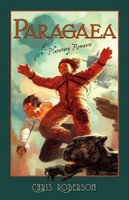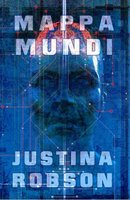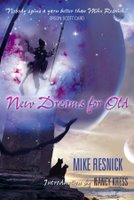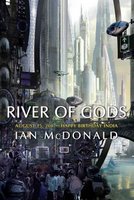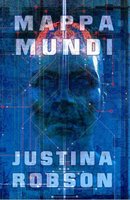Rick Kleffel of The Agony Column has conducted a long, in-depth interview with Infoquake author David Louis Edelman. The interview is online in its entirety in both MP3 and RealAudio formats. Meanwhile, it will air in edited form on KUSP on September 22nd, and will appear at some point as part of another program on NPR (details as we have them).
In his online introduction, Rick says, “I loved this novel, and the more I think about it, the more I like it. It stayed with me, this economic vision of the future as one giant marketing meeting and product development push. The characters were quite well delineated, the vision of the future seemed an entertaining twist on the present and the plot, about a last-minute product-launch crush, was so reminiscent of my own experiences that it seemed really gripping.”
Now, this is really interesting to me.
Infoquake is getting rave reviews, with some sites calling it “a triumph of speculation,” and “the science fiction book of the year,” with multiple comparisons to the work of Charles Stross, Cory Doctorow, and Vernor Vinge. But you notice that one of the things which Rick – who is very enthusiastic about the work overall – responds to is that Infoquake was “so reminiscent of my own experiences.”
Now, why is that interesting to me? Well, my own love for Infoquake is probably coupled tightly with the fact that in 2000 I worked right in the heart of the dot com bubble, for an online publishing start-up in downtown San Francisco. And I worked for Natch. Utterly. He was a she, but it was Natch.
I remember coming into work one day, and my boss started enthusing about this “terrific” book she was reading on the “three stages of company building.” She explained that first you hired trail blazers, whose job was to hack out the territory from the jungle. Then, she said, you fired them and replaced them with company builders, who knew how to build the infrastructure. They were in turn to be replaced by managerial types, who had the skills necessary to run a sustainable company on a day-to-day basis.
“Wait,” I said, “Are you telling me now that after we’ve busted our humps building this company for you, you are going to fire us all and replace us with suits?”
“Any of us,” she said with a air of incredulity at my ignorance that dared me to take issue, “should be willing to step down for the good of the company. Why, I’d stand aside myself if I thought it was the right thing to do.”
“Yes,” I thought, but didn’t say aloud, “but you’d still own it.”
So you see, I was uniquely suited to appreciate David’s work.
But while the book is getting rave reviews everywhere, the one or two folks who haven’t liked it, or have minor problems with it, seem to also be people who have also worked for a Natch of their own.
Now, I see that SFRevue, who likes the book enough to continue with the series and says, “he’s got a good grasp of corporate warfare and I’m interested enough to want to see where he goes with the story from here,” nonetheless complains that “the characters in the book are quite like people I’ve known in the world of international entrepreneurship. Work is their life, and much as I channel the puritan ethos myself, it’s hard to do anything other than feel sorry for them as they ramp themselves up for another 36 hour stint to prepare for the next dog and pony show.”
Now, I’m not arguing with the SFRevue review, not at all. Please don’t think that. And there review is a 90% positive one. The more apropo examples I’m thinking of are from private conversations. I’m just interested to see that Rick and I liked the book because we knew the characters, where others have seen this as a detriment. And I wonder why that is.
I wonder too if it has to do with the fact that some readers today have a problem with flawed protagonists. I’m just posing a question here, but it may be a side effect of the Hollywood formula film that we are less prepared to enjoy unsympathetic or unethical leads these days. Certainly, I’ve seen a few critics call out flawed leads as “daring” choices in their reviews. But that suggests they are also rare choice in today’s clime. So, is it a problem for today’s audience – to read about someone who is less than perfect? I don’t know. And yet, wasn’t the Achilles Heel one of the essentials of Greek tragedy?
 Meanwhile, one wonders if John will write a Silmarillion one day.
Meanwhile, one wonders if John will write a Silmarillion one day.
